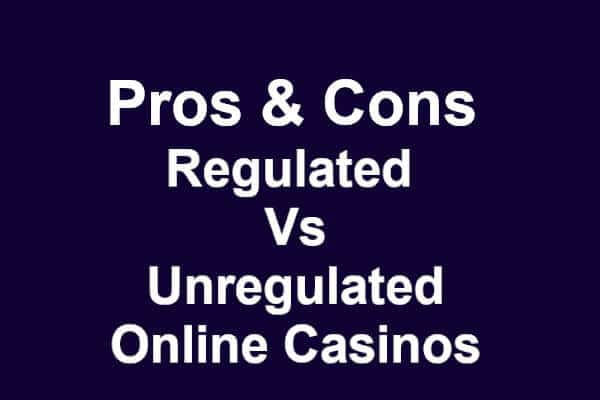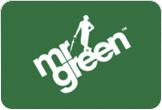Regulated Versus Unregulated Casinos: What’s The Difference?
In the online casino world, there are two types of casinos; regulated and unregulated. I feel an easier way of phrasing this is licensed or unlicensed. In some scenarios, online casinos operating without a valid online gambling licence are doing so illegally, especially if they take bets from players in countries with a licensing regime.
So, what is a regulated or licensed casino?
Regulated casinos operate under a regulating authority. They’re the law-abiding citizens of the online casino world. They follow strict rules and regulations set by the licensing bodies and pay a yearly fee to the regulator. They’ve dotted the “i” ‘s, crossed the “t” ‘s, and are monitored closely.
On the other hand, unregulated online casinos operate outside of established laws. They’re usually located in countries where authorities don’t seem to care about illegal gambling, like Russia, Costa Rica, Israel, and Panama. Unregulated casinos do not have an online gambling licence. There’s usually almost no transparency; if something goes wrong, you’re alone to sort it out, and no one will help!
Pros of Playing at Regulated Online Casinos
Now we’ve covered the differences between regulated and unregulated online casinos, let’s look at the pros and cons of both options.
As I mentioned earlier, I strongly recommend avoiding unregulated casinos, but there are reasons why players choose unlicensed sites.
To kick things off, I’ll walk you through some of the main benefits and advantages of playing at regulated casinos and why you should always choose a licensed casino.
Safety and Security
The most significant advantage of playing at a regulated casino is that the site and its games have passed rigorous checks and are monitored regularly. Regulated casinos are held accountable by their respective regulatory body.
Some of the primary regulators include the UK Gambling Commission, the Malta Gaming Authority, and the Gibraltar Gambling Commissioner.
These bodies enforce strict standards, stipulating everything from how a casino handles your personal and financial information to how your money must be kept.
Regulated casinos must use high-level encryption to secure your personal data and sensitive financial information and comply with all relevant data protection laws, ensuring your information is not misused or mishandled.
While I’m sure some regulated casinos fall short in this area, on the whole, your personal information and sensitive details will be significantly safer at a regulated casino when compared to an unregulated counterpart.
Fairness and Trustworthiness
Now, I want to talk a bit about fairness and trustworthiness. A Random Number Generator (RNG) powers most games at an online casino. The exception is Live Dealer Games.
This piece of software ensures the outcome of every spin, card dealt, or dice thrown is entirely random and fair.
Online gambling regulators have stringent rules surrounding random number generators, and game developers must prove their random number generator is truly random.
Regulated casinos’ games are audited and certified by independent organisations like eCOGRA or iTech Labs, which test the RNG and the game’s return to player (RTP) percentage.
These tests must be passed before the games can be offered to the general public.
The auditors get full access to the games and their source codes, ensuring game developers aren’t able to hide anything so you know the games are fair, random, and honest.
Responsible Gambling Measures
Another reason I advocate playing only at regulated online casinos relates to responsible gambling.
All regulated sites must adhere to (usually) stringent rules regarding the player protection tools they must offer. By law, regulated online casinos in the UK, for example, must provide players with tools to manage their gameplay.
These tools include deposit limits, loss limits, wager limits, the ability to take a time-out, and, where appropriate, self-exclusion for those who feel their gambling is out of control.
In the UK, regulated casinos must be linked to GAMSTOP. This service allows you to self-exclude from all online gambling sites licensed in the UK. This is ideal for problem gamblers, who previously had to manually self-exclude from every UK casino they could find.
Winnings and Payouts
Now, let’s turn our attention to payouts.
One of the main advantages of playing at a regulated casino is the assurance that you’ll receive your winnings.
I trust the casino will pay me when I play at a regulated casino and win. If they don’t, I have plenty of recourse, and provided I haven’t broken any terms and conditions, I’ll almost always get paid.
What’s more, regulated casinos offer various ways to withdraw funds.
You can use conventional payment methods like bank transfers, debit cards, e-wallets and cryptocurrencies.
Regulated casinos also generally have higher payout limits, in my experience. In some jurisdictions, casinos must “lock” a withdrawal once you request it. This means you can’t cancel your withdrawal and end up spending all your hard-earned winnings, something I’m sure we’re all guilty of now and then!
Customer Support and Dispute Resolution
At regulated online casinos, customer support and dispute resolution play crucial roles in ensuring you can get the help and support you need – and that any issues you face are dealt with professionally and promptly. While regulated online casinos aren’t usually required to offer any specific type of customer support, they are expected to be readily available to players.
When you play at a regulated casino, you can expect to be able to access customer support via live chat, email, or even over the phone. However, it’s not only about how you can physically get in touch with the customer support team but also about the quality of the support provided. In my experience, the customer support teams at regulated casinos are trained to a far higher standard when compared to unregulated casinos. They may not always be able to answer your question on the spot, but they’ll usually do their best.
Dispute resolution is a topic I urge you to learn more about. If you ever run into problems playing at an online casino – this will usually revolve around you not being paid – your first point of call will be the casino itself. However, if they don’t “budge”, most regulators require their licensees to work with an independent third party.
This is known as dispute resolution – also called a third-party arbitration service.
For example, the Independent Betting Adjudication Service (IBAS) takes player complaints directly in the UK. Their answer is final, which means the casinos are accountable; they can’t simply do what they want.
Cons of Playing At Regulated Online Casinos
Having explored the many benefits of playing at regulated online casinos, it’s time to turn our attention to the other side of the coin.
Let’s look at some of the main downsides to playing at licensed sites.
Stringent Regulations
One of the most visible drawbacks of playing at regulated casinos is the stringent rules and regulations imposed on operators.
For example, some jurisdictions prohibit certain types of games, leaving players unable to play certain kinds of games.
Moreover, as seen in the UK, these regulations can sometimes remove specific in-game features.
The UKGC, for example, outlawed bonus buys, slam-stopping (quick-spinning) and autoplay.
While these measures promote responsible gambling, it can be a real headache for players and is one of the leading reasons why players choose unregulated casinos instead.
Annoying KYC and SOW Checks
Regulated casinos must also carry out Know Your Customer (KYC) and Source of Wealth (SOW) checks. These have become notoriously frustrating for many players. While they’re designed to prevent fraud and money laundering, many players find them intrusive. Online casinos often interpret the exact rules on what documents are acceptable differently, causing confusion and delays.
A KYC check is what most players will come across, and it requires you to provide proof of your identity and residence. This is usually achieved by submitting copies of your ID and a utility bill or bank statement that shows your full name and address. This process can be time-consuming and annoying, especially if the casino takes a while to verify the documents.
SOW is even more complex – although, thankfully, they’re generally restricted to the UK.
If you receive an SOW request, prepare to show the casino everything about your finances. You will need to provide information about your income and where it came from – something some players outright refuse to do. This can often be challenging if you’re self-employed or have an unconventional income source.
Longer Withdrawal Processing Times
Another common downside of playing at regulated casinos is the sometimes long withdrawal processing times.
When you request a withdrawal, the casino may let you know they’re “carrying out additional security checks”, and the likelihood of this increases exponentially if you deposit frequently or withdraw a significant amount. These checks can delay processing, sometimes taking days to process your withdrawal.
Pros of Playing at Unregulated Online Casinos
I’ve shown you some of the pros and cons of regulated casinos. I want to preface this next section by repeating that I don’t recommend playing at unregulated casinos. Doing so carries significant risks, details of which I’ll cover later. However, I understand certain advantages some players may find appealing.
Greater Variety of Games (Sometimes)
One visible benefit of unregulated casinos is their wider variety of games. As licensing restrictions don’t bind them, they can feature games from all software providers, not just those licensed in your jurisdiction.
This means you can often find a crypto casino, for example, with upwards of 5,000 games, including titles you might not see at a regulated casino.
It’s worth noting while these games might be more diverse, they don’t come with the same guarantees of fairness and security that regulated casinos offer.
I should also point out that the opposite can be true. Unregulated casinos don’t have a licence, a prerequisite for most reputable game developers to host their games.
However, several unregulated casinos get around this by using third-party white-label software.
Potentially Better Bonuses
Another potential appeal of unregulated casinos is the possibility their bonuses are more generous when compared to those offered by regulated casinos.
As unregulated casinos aren’t subject to the same operational costs and legal constraints as their regulated counterparts, they can often afford to pass some of these savings onto players by offering bigger and “better” bonuses.
For example, you might find more significant welcome bonuses, no-deposit free spins, or lower wagering requirements. However, it’s important to remember these bonuses often come with strings attached. For example, the terms and conditions may be deliberately vague, have complex playthrough requirements, and have sneaky clauses that allow the casino to deny a payout on a whim.
Easier Verification (If Any)
By far, one of the most common reasons why players turn to unregulated casinos is due to the lack of verification checks.
Unregulated casinos are known to take a lax approach to KYC checks, with some even advertising themselves as ‘no-KYC’ casinos. This means they don’t require you to provide proof of your age or location.
When you sign up at an unregulated casino, you can start playing immediately without submitting any documents. This hands-off approach can seem very appealing, especially to those who value their privacy or live in a country like the UK, where verification checks can take a while.
However, this isn’t to say that unregulated casinos never require KYC checks.
It’s more that these checks aren’t usually needed upfront. Instead, they often come into play when you try to withdraw, especially if it’s a lot of money. If you play at an unregulated casino, there’s no telling how they’ll process your KYC documents, too. Some shadier sites have been found to sell their customer’s data. This opens the door to many issues, including fraud and identity theft.
Gamble With Crypto
One benefit of unregulated casinos that has become much more popular in recent years is their acceptance of cryptocurrencies. This digital currency, including Bitcoin, Ethereum, and others, is used almost exclusively at unregulated casinos. Unlike fiat-based payment methods, it allows the casino to run without using any payment provider. This means they can’t be shut down, allowing them to take deposits worldwide anonymously.
However, many players prefer using crypto, too. Firstly, cryptocurrencies allow for a greater level of privacy. As transactions are made via a digital wallet and broadcast onto the Blockchain, your sensitive details are separated from the transaction.
Cryptocurrencies are known for their speed. Deposits and withdrawals can be processed faster than traditional banking methods. If a casino is paying its players, it’s not uncommon to see unregulated crypto sites offer instant withdrawals. This is a huge selling point, which many players prioritise looking for.
Unregulated crypto casinos also appeal to players banned from playing at regulated casinos by their governments. Crypto is more accessible to buy than ever, meaning players aren’t restricted to conventional payment methods that their bank or payment processor could easily block.
Cons of Playing at Unregulated Online Casinos
Now that we’ve considered why players may turn to unregulated casinos let’s look at the downsides. It’s potentially risky terrain, so think about what could go wrong when playing at an unregulated online casino.
Lack of Legal Protection
One of the most significant disadvantages of playing at unregulated casinos is the lack of legal protection for players.
These casinos operate outside legal frameworks, so there’s no oversight or accountability to ensure they follow fair and ethical practices.
This absence of regulation exposes players to various risks, including fraud, unfair practices, and potentially rigged games.
Unregulated casinos can do whatever they want, with no regulatory body overseeing their operation. They don’t have to offer fair games, pay players their winnings, or carry out verification checks. While not all unregulated casinos are out to deceive players, almost every casino that cheats on players is an unregulated one – or, at best, regulated in a poor licensing jurisdiction like Curacao.
Moreover, many unregulated casinos are owned and operated by companies that are notoriously difficult to track down.
It’s often impossible to even find a company name, a business address or information about the directors.
If you run into problems, you often can’t even file a police complaint against the company, as you don’t know who they are!
Customer Support is Often Limited
Another area where unregulated casinos often fall short is customer support. You can usually rely on getting help when you need it at regulated casinos. However, customer support is often inadequate or non-existent at unregulated casinos.
This might not seem like a big deal when things are running smoothly, and you enjoy your session. However, when problems arise, you could find yourself on your own.
Trying to resolve a complaint or dispute can be incredibly frustrating when there’s no one available to help or when the available help isn’t up to par.
Even when unregulated casinos provide some form of customer support, it’s often limited to certain hours or only available via email, making it much less convenient and efficient than many regulated platforms’ 24/7 live chat services. This is often deliberate; don’t forget, they can refuse to respond to you.
Potential for Financial Losses
Finally, one of the most significant risks of playing at unregulated casinos is the potential for losing money.
While gambling is always a risk, you take on additional risk when playing at unregulated casinos: the casino can simply refuse to pay you when you win.
Without any regulatory body holding them accountable, unregulated casinos can refuse to pay out winnings without repercussions.
They could close your account and give you the silent treatment. If this happens, you have limited legal recourse.
You could potentially take the casino to court – but this requires you to know the company behind the site. It would also be a lengthy, expensive, and complicated process without guaranteeing success.
Note: If you’ve deposited at an unregulated casino using a credit or debit card, you may be able to issue a chargeback. You will need to prove to your bank that the casino is unlicensed.
The best course of action is prevention: understanding the risks before you start playing and choosing a licensed and regulated casino to ensure you get paid when you win.
The Main Online Gambling Regulators
As we take an in-depth look at online gambling regulation, it’s also essential to understand who regulates sites. Below, I will walk you through a few of the leading online gambling regulators.
The UK’s Gambling Commission
The UK Gambling Commission (UKGC) is among the world’s most respected regulators. This independent regulatory body governs all gambling activities within the United Kingdom, including online casinos. The UKGC was established under the Gambling Act 2005, and its job is to keep gambling fair and safe for all.
The UKGC sets stringent rules for operators, ensuring the fairness of games, offering players numerous responsible gambling tools, ring-fencing customer funds, and enforcing strict anti-money laundering policies. They also require casinos to have measures to protect customer funds in case of insolvency. You’re in safe hands if you’re playing at a UKGC-regulated casino.
However, in recent years, the UKGC has been accused of being too heavy-handed with regulation. For example, banning bonus buys and removing the autoplay option on video slots drove many UK players to choose unregulated or offshore casinos. Similarly, the SOW checks have been described as “crazy” by many. Casinos operating in the UK are so scared about getting fined that they often request more from players than is needed.
The Maltese Gaming Authority
The Malta Gaming Authority (MGA) is another respected regulator in the online gambling world. Based in Malta, the MGA licences many of Europe’s most popular online casinos.
Like the UKGC, the MGA ensures a fair and safe gambling environment. They require casinos to demonstrate financial stability to protect players from potential insolvency issues. They have robust responsible gambling guidelines, strict random number generator specifications, and rules on how sites must handle customer data.
While the MGA isn’t quite as strict as the UK, a site licensed in Malta is generally considered pretty safe to play at. I’d feel even more comfortable if I saw a UK licence, but I understand many brands are purposely leaving the UK market as it’s too expensive to operate in now.
Gibraltar Regulatory Authority
The Gibraltar Regulatory Authority (GRA) is another big player in online gambling regulation. The GRA tends to licence more prominent brands. Think of some significant high-street bookmakers with huge online gambling websites. They choose a Gibraltar licence mainly for tax purposes.
However, the GRA takes their job seriously, and they enforce tons of regulations on licensees. These requirements include measures to protect customer data, prevent underage gambling, promote responsible gambling, and combat money laundering.
The GRA also requires licensees’ games to be audited independently to ensure fairness. In addition, any casino licensed by the GRA must keep player funds separate from operational funds, providing players with additional financial security.
Alderney Gambling Control Commission
The Alderney Gambling Control Commission (AGCC) is another small yet well-respected online gambling regulator. Despite its small size, Alderney is home to several of the world’s most prominent online casinos, thanks to tax laws.
Established in 2000, the AGCC ensures fair, transparent, and crime-free gambling operations. It issues licences to operators, sets very high standards, and conducts regular audits. If they find an operator in breach of a regulation, they do not hesitate to issue a fine or retract the licence.
The AGCC’s primary goal is to protect players while maintaining the integrity of online gambling. Their rigorous regulatory framework makes it one of the most respected gambling commissions globally.
Curacao
Curacao, a tiny Caribbean island, is a territory many are unfamiliar with.
However, it’s the most prominent online gambling regulator licencing thousands of online casinos. You’ll often see a Curacao logo at the bottom of a casino’s website, implying trust and integrity. However, I want to be clear that a licence from Curacao does not mean much.
Unlike some of the other regulators we’ve discussed, Curacao is known for its comparatively lax approach to regulation. This, combined with the low cost of acquiring a licence (as little as $ 5000), makes it an attractive option for new, smaller operations. However, the Curacao licensing (scam, as many call it) has many problems.
Curacao operates under a unique system with four’ master licence’ holders. These master licence holders can then issue ‘sub-licenses’ to individual online casinos, and it’s the master licence holders who are responsible for regulating their sub-licensees. While one or two master licence holders are somewhat responsive, the others don’t care what casinos do with their licences.
Numerous reports of players at Curacao-licensed casinos face issues when trying to withdraw winnings, fake games being offered, and criminality involved. Most of the time, these issues go without penalty; for example, two master licence holders don’t even have a website!
Additionally, Curacao-regulated casinos generally offer an abysmal selection of responsible gambling tools. While they’re all required to provide self-exclusion, that’s it. Moreover, players often have to manually contact the customer support team to enter into a self-exclusion agreement, which is a big no-no in the rest of the online gambling world.
While a licence from Curacao does offer some protection, it depends on which four master licence holders a site is operating under. I am not saying all Curacao-licensed casinos are bad, but I would recommend being wary of a site unless you know it has a good reputation.
Conclusion: Why You Should Always Go Regulated
I always advise playing at regulated online casinos—ideally, one licensed by the UK’s Gambling Commission or the MGA.
When you play at a regulated casino, you can be confident the games are fair, your personal information is secure, and you’ll be paid anything you win. If anything goes wrong, you have the backing of a regulatory body unless it’s a site licensed in Curacao.
I understand the temptations of playing at an unregulated casino, especially for UK folks. However, the risks are high, and there’s no guarantee you’ll be paid any winnings.
Safety and security should be your top priority when choosing an online casino. Always check the casino’s licensing information before joining, and remember, not all licences offer the same level of protection.











